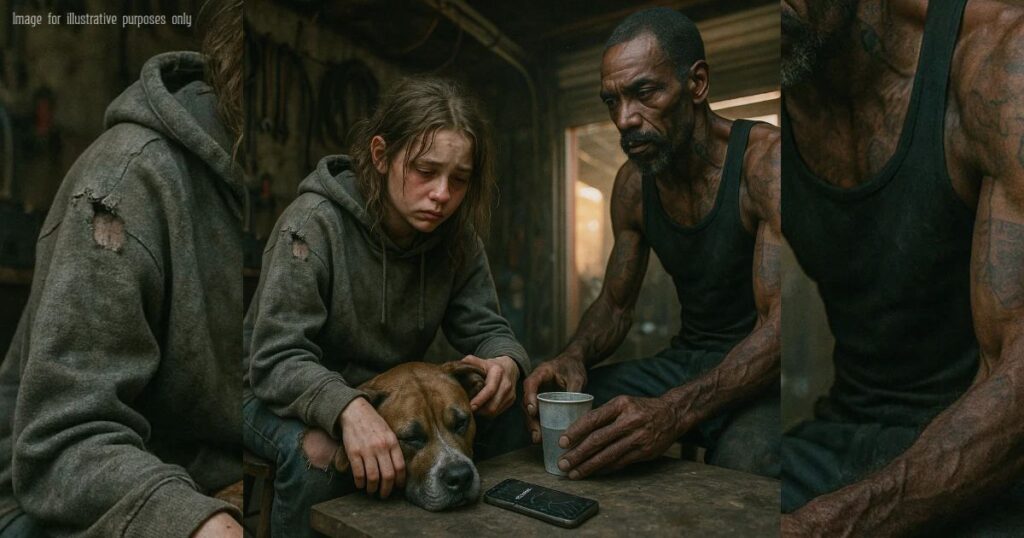She stepped into my garage like the last two minutes before a storm — helmet cracked, mirror dangling by a thread of tape, eyes set to silent the way you mute a phone when you’re hiding in a bathroom. The clock over the tool chest said 3:28. At five o’clock the landlord’s son would “inspect” their apartment, which really meant wander, judge, and invent reasons to push them out. If her bike didn’t run, she’d miss her shift, and a missed shift would become a note in a folder, and a note in a folder was how families vanished from leases around here.
“My brake’s soft,” she said, voice steady the way a glass is steady right up until you see the tremble at the rim. “And the headlight’s dead. I… I can pay a little.”
She held up twelve crumpled bills and a handful of change. On the inside of her wrist, beneath a bracelet woven with blue thread, the skin carried the faint yellow of old pressure. She caught me noticing and slid the bracelet higher. I didn’t comment. I used to think speaking first was how you did a rescue. Then life taught me that listening often opens the door quicker.
“Name’s Hawk,” I said. “You can park the bike right there.”
She pushed a Honda Rebel onto my lift with the muscle memory of someone who had prayed with her hands and her weight more than once. The bike had a guardian bell on the lower frame, flattened like someone had stepped on it. I cut the zip ties holding that severed mirror, set the pieces aside, and flicked the headlight switch. Nothing. The brake lever came to the grip with almost no resistance.
“I can fix the light,” I said. “The rear line needs a bleed. Maybe the master. Have a seat in the office. There’s water. A chair that doesn’t wobble.”
“I’m fine here,” she said, staying near the lift. She stood so the exit was always in her peripheral vision. Flight lines. I knew those, too.
“I’m Elias Rivers,” I added, “but everyone calls me Hawk. You got a name, kid?”
“Maya,” she said. “Maya Alvarez.” She swallowed. “I have to make it to work by four-thirty. If I miss, they’ll cut my hours. If they cut my hours, we can’t keep up. The inspection’s at five. He’ll say we’re not keeping the place up if I’m late. He writes things down.”
“He” didn’t need a name to be real.
I set my torque wrench down. “We’ll get you there,” I said. “But I’m going to ask two questions while I wrench. First, has anyone been messing with your bike?”
Maya hesitated. Her eyes did the quick math of risk. Then she nodded once.
“Second,” I said, “do you want help beyond the bike?”
No nod. No shake. Just a long exhale and the tiniest lift of a shoulder, the human equivalent of a white flag folded small enough to hide in your palm.
I texted Zee with my left hand while I cracked the banjo bolt: need a “coupon” for a friend — brake bleed + headlight + advice. She sent back: using my Saturday voice, be there in 20. I thumbed another message to Reverend Lorraine: any chance of a bed if things go sideways? Her reply came fast as an amened choir: door’s open, Hawk.
I bled the line slow, watching old fluid thread down like tea left too long.
The radio in the corner played old country because I keep it there on purpose.
Some songs remind people of front porches, not back alleys.
I swapped the bulb, checked the fuse, and found the real culprit in a frayed wire, the kind that looks accidental until you see the clean little nick like a planned silence.
I soldered it and heat-shrank the joint.
The headlight flared to life with a clean white square on the far wall.
Maya flinched, then laughed at herself. Not the free laugh you hear in parks. The private one people use when their nervous system keeps its foot on the brake.
“How much?” she asked, fingers already reaching for those bills.
“Put your money away,” I said. “Pay me with a story. I don’t need the whole thing. Just enough to point us in the right direction.”
“A guy from my building,” she said. “He likes to… supervise. He checks whose cars are in the lot, what time we get home.
He said my bike is ‘too loud for decent tenants.’
I told him it was my transportation to work. After that, the bell went flat.
Then the mirror.
Then the wire.
He said if I made trouble, ‘everything’ would be everyone’s business.” She looked at her shoes. “He calls me late from blocked numbers. Says he’s ‘just making sure’ I’m safe.”
The words were careful.
She didn’t say hurt, or threat, or any of the things that slam doors. She named the behaviors that wedge them open.
“You live with your mom?” I asked.
She nodded. “She cleans houses. She’s got a permanent card. She worries that people will think we don’t belong if we make noise.”
“I hear you,” I said.
I kept hearing other things, too: an office door that never opened for my son when he needed help; a night I arrived two hours too late; the weight of a motorcycle helmet that wasn’t mine in my hands.
Grief is a room in a house you live in forever.
You learn to cook and sleep and laugh in the other rooms. But the door is always there, and sometimes the radio plays a harmony that lines up with the hinges.


